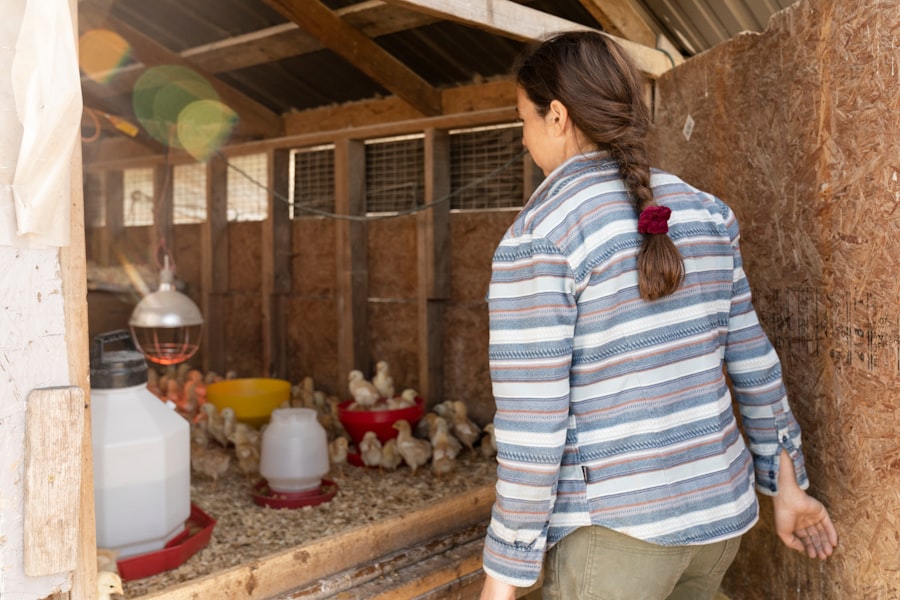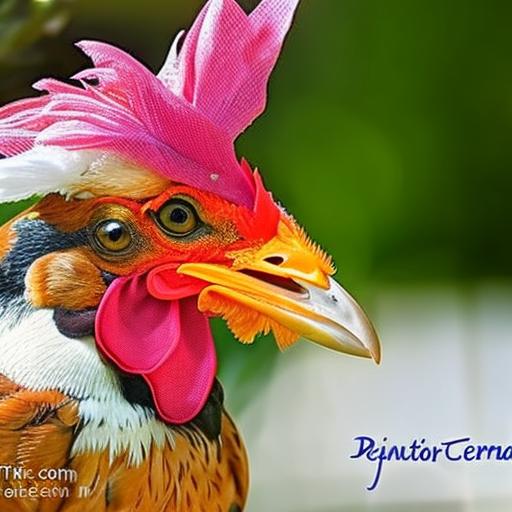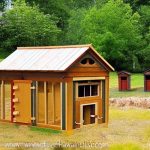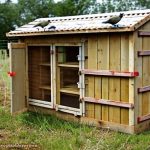Keeping your chickens cool is crucial during hot summer months. Just like humans, chickens can suffer from heat stress, which can lead to health problems and even death. As a responsible chicken owner, it is important to take the necessary steps to prevent heat stress and keep your chickens comfortable. In this blog post, we’ll discuss how to recognize the signs of heat stress, choose the right location for your chicken coop, provide adequate shade and ventilation, ensure access to cool water, adjust their diet, offer cooling treats, maintain a clean environment, and stay prepared for extreme temperatures.
Key Takeaways
- Keeping chickens cool is important to prevent heat stress and maintain their health.
- Signs of heat stress in chickens include panting, lethargy, and decreased egg production.
- Choosing the right location for your chicken coop and providing adequate shade are crucial for keeping chickens cool.
- Proper ventilation is important for improving airflow and reducing heat in the coop.
- Hydration is key, so make sure to keep your chickens’ water cool and clean.
Signs of Heat Stress in Chickens: What to Look for and How to Prevent It
Signs of heat stress in chickens include panting, lethargy, and decreased egg production. When chickens are exposed to high temperatures for extended periods of time, their bodies struggle to regulate their internal temperature. This can lead to dehydration, organ failure, and even death. To prevent heat stress in your chickens, it is important to provide shade, ventilation, and plenty of water. Make sure your coop is well-ventilated and consider adding fans or misters to help cool the air. Additionally, provide access to fresh water at all times and consider adding ice or frozen water bottles to their waterers to keep it cool.
Choosing the Right Location: Finding the Best Spot for Your Chicken Coop
Choosing the right location for your chicken coop is essential for keeping your chickens cool. Look for a spot that is shaded and well-ventilated. Avoid areas that receive direct sunlight for extended periods of time as this can quickly raise the temperature inside the coop. Consider the direction of prevailing winds in your area and position your coop in a way that allows for good airflow. This will help keep the air inside the coop fresh and cool.
Providing Adequate Shade: Tips for Creating a Cool and Comfortable Environment
| Tip | Description | Benefits |
|---|---|---|
| Plant Trees | Planting trees around your property can provide natural shade and reduce the temperature of the surrounding area. | Reduces energy costs, improves air quality, and creates a more comfortable outdoor environment. |
| Install Awnings | Awnings can be installed over windows, doors, and patios to provide shade and reduce the amount of direct sunlight entering your home. | Reduces energy costs, protects furniture and flooring from sun damage, and creates a more comfortable indoor and outdoor environment. |
| Use Shade Sails | Shade sails are a cost-effective way to provide shade in outdoor areas such as patios, decks, and playgrounds. | Reduces heat and UV exposure, creates a more comfortable outdoor environment, and adds aesthetic appeal to your property. |
| Install Window Film | Window film can be applied to windows to reduce the amount of heat and UV rays entering your home. | Reduces energy costs, protects furniture and flooring from sun damage, and creates a more comfortable indoor environment. |
Providing adequate shade is crucial for creating a cool and comfortable environment for your chickens. Natural shade from trees or shrubs is ideal, as it not only provides relief from the sun but also helps cool the surrounding air. If natural shade is not available, you can use tarps or shade cloth to create additional shade. Attach these to the sides of your coop or run to block out the sun. Another option is to add a covered run to your coop. This will provide a shaded area where your chickens can escape the heat.
Ventilation: Why It’s Important and How to Improve Airflow in Your Coop
Good ventilation is important for removing heat and moisture from your coop. Without proper airflow, the air inside the coop can become stagnant and hot, leading to heat stress in your chickens. To improve ventilation, consider installing vents or windows in your coop. These will allow fresh air to enter and hot air to escape. You can also add a fan or exhaust system to further improve airflow. This will help keep the air inside the coop cool and prevent heat stress.
Water: The Importance of Hydration and Tips for Keeping Your Chickens’ Water Cool

Water is essential for keeping your chickens hydrated and cool during hot weather. Make sure they have access to cool, clean water at all times. Consider adding ice or frozen water bottles to their waterers to help keep it cool throughout the day. This will provide them with refreshing water to drink and help lower their body temperature. It is also important to clean and refill their waterers frequently to prevent bacteria growth.
Feeding: Adjusting Your Chickens’ Diet to Help Them Cope with Heat
Adjusting your chickens’ diet during hot weather can help them cope with the heat. Offer fresh fruits and vegetables with high water content, such as watermelon, cucumbers, and lettuce. These will not only provide hydration but also help cool their body temperature. Avoid feeding your chickens heavy or fatty foods during hot weather, as these can increase their metabolic heat production. Instead, opt for lighter and more easily digestible foods. Additionally, consider adding electrolytes to their water to help them stay hydrated.
Cooling Treats: Homemade Recipes for Healthy and Refreshing Snacks
Offering cooling treats to your chickens can provide them with a refreshing snack and help lower their body temperature. Frozen berries or watermelon are great options as they are high in water content and provide a sweet treat. You can also make homemade popsicles by blending fruits with yogurt and freezing them in ice cube trays. Another idea is to freeze herbs like mint or basil in ice cubes and offer them as a cooling treat. These treats will not only help keep your chickens cool but also provide them with additional nutrients.
Keeping Your Chickens Clean: Maintaining a Hygienic Environment to Prevent Heat Stress
Keeping your coop and run clean is important for preventing heat stress in your chickens. Bacteria growth can thrive in dirty environments, leading to health problems for your chickens. Clean your coop and run frequently, removing any droppings or soiled bedding. Use a dust bath to help your chickens stay clean and cool. This will also help prevent pests such as mites or lice. Consider adding diatomaceous earth to your coop, as it is a natural pest control method that can help keep your chickens healthy and comfortable.
Staying Vigilant and Prepared for Extreme Temperatures
Keeping your chickens cool and comfortable during hot weather is crucial for their health and well-being. By staying vigilant for signs of heat stress and taking the necessary steps to prevent it, you can ensure that your chickens stay healthy all summer long. Remember to choose the right location for your coop, provide adequate shade and ventilation, ensure access to cool water, adjust their diet, offer cooling treats, maintain a clean environment, and stay prepared for extreme temperatures. With these tips, you can help your chickens stay cool and healthy throughout the summer season.
If you’re looking for ways to keep your chickens cool during extreme heat, check out this helpful article from Poultry Wizard. They provide valuable tips and insights on how to ensure your chickens stay comfortable and safe in hot weather. From chicken coop interior ideas to chicken coop run plans, Poultry Wizard covers all aspects of creating a cool environment for your feathered friends. Don’t miss out on their expert advice on how to insulate a chicken coop and where to position it for maximum shade and ventilation. For more information, visit https://poultrywizard.com/keeping-chickens/chicken-coop-interior-ideas/.
FAQs
What is the ideal temperature range for chickens?
Chickens are comfortable in temperatures ranging from 50-80°F. Temperatures above 90°F can be dangerous for chickens.
What are the signs of heat stress in chickens?
Signs of heat stress in chickens include panting, lethargy, loss of appetite, decreased egg production, and in severe cases, death.
How can I keep my chickens cool in extreme heat?
You can keep your chickens cool in extreme heat by providing shade, plenty of fresh water, and good ventilation. You can also use fans or misters to cool the air around the coop.
What kind of shade is best for chickens?
The best kind of shade for chickens is natural shade from trees or shrubs. You can also use tarps or shade cloth to create shade over the coop or run.
How often should I change my chickens’ water in extreme heat?
You should change your chickens’ water at least twice a day in extreme heat to ensure that it stays cool and fresh.
Can I give my chickens ice water to cool them down?
No, you should not give your chickens ice water to cool them down. Cold water can shock their system and cause more harm than good. Instead, provide cool, fresh water and shade.
What should I do if I suspect my chickens are suffering from heat stress?
If you suspect your chickens are suffering from heat stress, move them to a cooler location immediately and provide them with cool water. You can also try to cool them down with a fan or misters. If their condition does not improve, contact a veterinarian.
Meet Walter, the feathered-friend fanatic of Florida! Nestled in the sunshine state, Walter struts through life with his feathered companions, clucking his way to happiness. With a coop that’s fancier than a five-star hotel, he’s the Don Juan of the chicken world. When he’s not teaching his hens to do the cha-cha, you’ll find him in a heated debate with his prized rooster, Sir Clucks-a-Lot. Walter’s poultry passion is no yolk; he’s the sunny-side-up guy you never knew you needed in your flock of friends!







